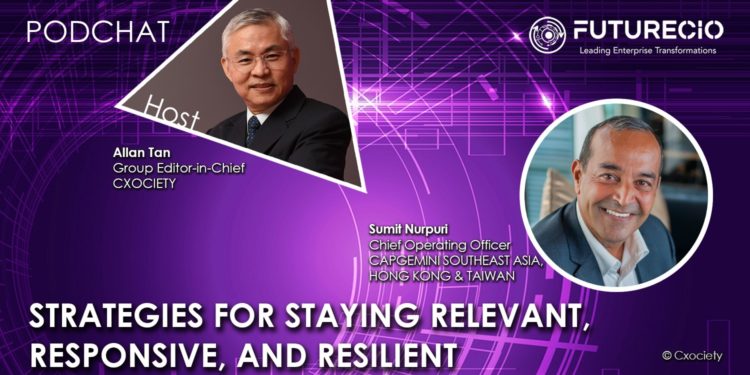Jay Forte is president and founder of The Forte Factor and certified executive coach, wrote in a blog that things have changed for many organisations from how they do business to how work is done. He added that while many feel compelled to return to the way things were before COVID-19, this isn’t possible.
Many of the things that previously filled our days have been replaced with things we either never thought possible or thought we would get to someday, like workplaces with fully remote employees, touchless contact, effective video sales calls, home delivery of nearly every product, and even remote doctor visits.
He opined that to be successful in a constantly changing global environment, an organisation needs to be responsive, resilient, and ready. I believe one more action is missing from the list – to be relevant.
For his part, Sumit Nurpuri, chief operating officer of Capgemini Southeast Asia, Hong Kong & Taiwan, says to be relevant, responsive, and resilient (3Rs) necessitates agility – the ability to pivot quickly to what is happening, whether in the market, with one’s employees, or responding to a change in process or operating models.
He added that this agility can be supported by increased investments and adoption of emerging digital technologies, and operational and business model innovation. He adds that beyond this adaptability, it is also equally important to focus on organisational talent and culture, including people upskilling and employee engagement.
Role of digital in the 3Rs
He stated that being digital is central to achieving the three Rs. He clarifies that this is different from doing digital – where the focus is on technology adoption and digital engagement.
“By focusing on people and culture, we're empowering the entire organisation, rather than a few digital champions while the traditional organisation lumbers along in parallel,” he continued.
On transformation
Asked if it is possible to achieve the 3Rs without undertaking some form of transformation, Nurpuri acknowledges that some degree of change and willingness to pivot and adapt is necessary.
“However, this change can and take on a form beyond digital transformation to also encompass a wider, holistic cultural shift,” he elaborated.
Getting priorities straight
For Nurpuri, two key priorities for organisations moving forward are culture and people. While technology is still important, digital champions will be needed to build a culture of being digital as opposed to only doing digital. Also, having modularity is a key lesson.
He suggested building loosely coupled components in the organisation so that when something changes, we can take out one component and put in another quickly.
“Organisations that had modular operating models, modularity in processes, modularity in their offers for customers, were able to pivot quickly,” he opined.
Advice for leaders
“Ensure that your entire experience is consistent across all of your digital channels, physical channels, and the way customers engage with your organisation/brand. Always think out of the box, carry people along, adopt emerging technology, and innovate your business and operational model,” he concluded.
Click on the PodChat player to listen to Nurpuri go into the details of what it means to be relevant, responsive and resilient in the new normal.
- Define for us what it means to be relevant, responsive and resilient in the post-pandemic normal.
- Is it possible to achieve relevance, be responsive and resilient without necessarily undertaking some form of transformation?
- There are many priorities for business leaders today, including these three Rs. Where to start and how do you avoid breaking the bank and staying focused?
- Most businesses survived the roller coasters 2020 and 2021. Any one lesson in support of the three goals?
- Are business leaders in Asia able/ready to pivot and transform?
- What is your advice for business, operations and IT leaders for 2022? [I need to revise this]




